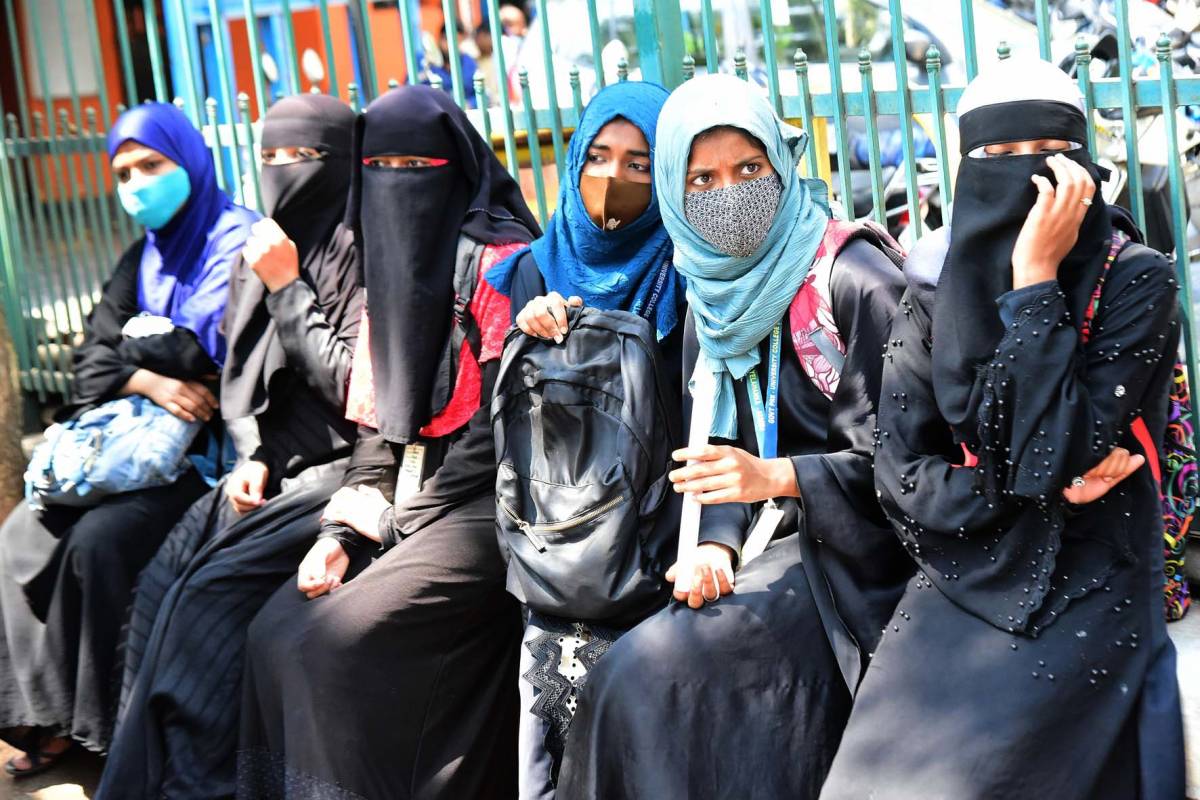The top court scheduled the matter on hijab ban for further hearing on September 14…reports Asian Lite News
Petitioners in the hijab ban case on Monday told the Supreme Court that Karnataka High Court faulted by holding wearing of the headscarf is not an essential practice of Islam, contending that since the court had no expertise in the field, it should not have gone into the issue of whether hijab was an essential religious practice by interpreting the Quran.
Senior advocate Yusuf Mucchala submitted before a bench of Justices Hemant Gupta and Sudhanshu Dhulia that human dignity is a constitutionally protected facet and scriptures say people have to observe modesty and wearing of the headscarf may be a personal marker in this context.
He said interpreters and scholars may disagree, but if a woman thinks wearing hijab is right, then she should follow it. “It is not the job of the courts to say follow one and don’t follow the other,” he said.
He added further that the Karnataka High Court used one interpretation of the Quran against another to give a finding on the essentiality of the hijab, which is objectionable.
The bench replied that it had no option, as the petitioners claimed it to be essential religious practice. “What option does the high court have but to point it out? Now you say the high court cannot do this.”
Muchhala said it is only judicial wisdom to not touch a field in which the court has no expertise and the court should have stayed away from it. “When HC encountered the question, it should have said hands off, we cannot look into that,” he said.
He said whether hijab is a fundamental right or not is applicable here and the question here is not about religious denomination but an individual’s fundamental rights.
The apex court was hearing submissions on the fourth day against the Karnataka High Court’s judgement of March 15 upholding ban on hijab in pre-university colleges.
The high court found no infirmity in the state government’s order that virtually banned the wearing of hijab by Muslim girls studying in pre-university colleges.
The top court scheduled the matter for further hearing on September 14.
Xxx
‘Don’t compare Turban, Kirpan with Hijab’
The Supreme Court on Thursday said that there is no comparison between Kirpan and turban of Sikhs with the hijab as a five-judge bench of the apex court held that wearing turban and kirpan is allowed for Sikhs.
The remarks came when a bench of Justices Hemant Gupta and Sudhanshu Dhulia heard various petitions challenging the Karnataka High Court judgement upholding the ban on hijab in educational institutes.
Advocate Nizamuddin Pasha, appearing for one of the petitioners, who is a student of Islam and Arabic, tried to draw similarities between the Kirpan and turban with the hijab.
Pasha said that the hijab is a part of the religious practice of Muslim girls and also asked if girls can be stopped from coming to school wearing hijab. He further argued that even Sikh students wear turbans.
Pasha stressed that cultural practices should be protected.
Justice Gupta said that comparison with Sikhs may not be proper as carrying of the kirpan is recognized by the Constitution. “So don’t compare practices,” the court remarked.
Justice Gupta said there are statutory requirements on turbans and these are all practices well established in the culture of the country.
Pasha tries to cite examples of foreign countries like France.
Justice Gupta said that we do not want to be according to France or Austria. “We are Indians and want to be in India,” the court said.
Pasha while countering the Karnataka HC judgement said that the hijab protects Muslim women.
Pasha said that the findings of Karnataka HC that the Hijab is a cultural practice are based on the assumption. He cited various religious books to support his arguments.
He also argued that it was a misreading of the footnote that the HC held that the Hijab is a “recommendation” and not “essential”.
Senior advocate Devadatt Kamat said that every religious practice is not essential but it is not that the state goes on restricting it.
During the hearing, Kamat, appearing for another petitioner apprised the court that divergent views were taken by Karnataka, Kerala and Madras High Court judgments on whether the hijab is an essential religious practice. Madras and Kerala courts have held Hijab as an essential religious practice but Karnataka HC differed, Kamat said.
“Karnataka Government Order on the prescription of uniform in educational institutes suffers from non-application of mind,” he further added. (ANI)

Leave a Reply